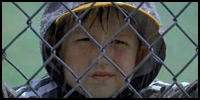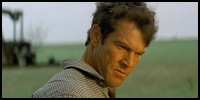
 |
The Rookie (2002) Directed by John Lee Hancock Cast: Dennis Quaid, Rachel Griffiths, Brian Cox, Beth Grant, Trevor Morgan, Jay Hernandez, Chad Lindberg, Robert Rosado, Marco Sanchez 2002 – 120 minutes Rated: Reviewed by Dustin Putman, March 18, 2002.  "The Rookie," directed by John Lee Hancock, is a typical, feel-good sports movie that yearns to be like 2000's "Remember the Titans," but lacks the energy and isn't as focused. Like its football predecessor, the baseball-themed "The Rookie" is based on a true story, and makes the mistake of assuming this particular story is one worth telling solely because of this fact. Unfortunately, the film is all over the map. Small, delicate scenes are intermixed with interminably long patches that could have easily been shortened. The picture might still not have necessarily been a great one, but at least it wouldn't have tested the patience so much.
"The Rookie," directed by John Lee Hancock, is a typical, feel-good sports movie that yearns to be like 2000's "Remember the Titans," but lacks the energy and isn't as focused. Like its football predecessor, the baseball-themed "The Rookie" is based on a true story, and makes the mistake of assuming this particular story is one worth telling solely because of this fact. Unfortunately, the film is all over the map. Small, delicate scenes are intermixed with interminably long patches that could have easily been shortened. The picture might still not have necessarily been a great one, but at least it wouldn't have tested the patience so much.
 Ever since his childhood days of being an army brat and moving rapidly from town to town, Jimmy Morris (Dennis Quaid) has had a strong passion for baseball. Due to an injury from the past that took him away from playing the sport, Jimmy now works as a science teacher at a West Texas high school. On the side, he coaches the school's underdog baseball team, who seem to lack commitment. When it is exposed that Jimmy's strong pitching arm has returned, the team makes a deal with him that, if they improve and win the district championship, he will try out for the minor leagues.
Ever since his childhood days of being an army brat and moving rapidly from town to town, Jimmy Morris (Dennis Quaid) has had a strong passion for baseball. Due to an injury from the past that took him away from playing the sport, Jimmy now works as a science teacher at a West Texas high school. On the side, he coaches the school's underdog baseball team, who seem to lack commitment. When it is exposed that Jimmy's strong pitching arm has returned, the team makes a deal with him that, if they improve and win the district championship, he will try out for the minor leagues.
At home, Jimmy is happily married to the high school's guidance counselor, Lorrie (Rachel Griffiths), and has three young children. While Jimmy can't help but think about taking a chance at the one thing he has always dreamt about but never achieved, he worries if the sacrifices his family may have to make in return is fair to them.  Following a prologue that shows Jimmy as a young teenager (Trevor Morgan), "The Rookie" spends an inordinate amount of time focusing on the high school baseball team's experiences during the season. Since the film is supposed to be Jimmy's story of triumph, this elongated detour that takes up half the running time pulls the focus away from him. By the time Jimmy tries out for the minors, the film has taken so long to get to this point that the second half progressively grows tedious. The finale, which is meant to be a crowd-pleaser, is so deliberately paced that it doesn't succeed on this count, either.
Following a prologue that shows Jimmy as a young teenager (Trevor Morgan), "The Rookie" spends an inordinate amount of time focusing on the high school baseball team's experiences during the season. Since the film is supposed to be Jimmy's story of triumph, this elongated detour that takes up half the running time pulls the focus away from him. By the time Jimmy tries out for the minors, the film has taken so long to get to this point that the second half progressively grows tedious. The finale, which is meant to be a crowd-pleaser, is so deliberately paced that it doesn't succeed on this count, either.
For a motion picture that is supposed to be about one's love for baseball, the sport almost appears to be viewed as a tedious burden up until the conclusion. Jimmy is apprehensive about trying out for the minors because of his age and, even after he makes the team, it takes him away from his family for several months, causing him to be unhappy. When director John Lee Hancock and screenwriter Mike Rich (2000's "Finding Forrester") make a sharp U-turn at the end and change their stance and Jimmy's on baseball, it is all the more difficult to swallow.  What "The Rookie" does get right is its mostly realistic character study of Jimmy, as well as the treatment of his solid relationship with Lorrie. The film thankfully dodges being sugarcoated in its emotions, even though cliches abound, such as Jimmy's problems with his difficult father (Brian Cox) and their eventual outcome.
What "The Rookie" does get right is its mostly realistic character study of Jimmy, as well as the treatment of his solid relationship with Lorrie. The film thankfully dodges being sugarcoated in its emotions, even though cliches abound, such as Jimmy's problems with his difficult father (Brian Cox) and their eventual outcome.
Dennis Quaid (2000's "Traffic") has always been a sorely underrated actor, and he slips into the shoes of Jimmy Morris with ease and dignity. Quaid humanizes his character enough that we do care about his happiness, even if we don't care about the plodding story he has been dropped in. Rachel Griffiths (2001's "Blow"), as the supportive Lorrie, does a nice job with a slightly underwritten part. It is nice to see Griffiths in a larger-scale movie than she is usually used to, but she deserves better material to work with.  "The Rookie" features a handful of memorable scenes, and the small-town feel of the proceedings is sumptuously transferred to film by cinematographer John Schwartzman (2001's "Pearl Harbor"), who makes good use of golden, sunlit hues. As a whole, however, it doesn't garner the type of impact it should. A tighter editor and a more centered screenplay could have done wonders for "The Rookie," which, in this finished incantation, is a well-meaning film that doesn't really offer up enough reasons for why it deserves to be seen.
"The Rookie" features a handful of memorable scenes, and the small-town feel of the proceedings is sumptuously transferred to film by cinematographer John Schwartzman (2001's "Pearl Harbor"), who makes good use of golden, sunlit hues. As a whole, however, it doesn't garner the type of impact it should. A tighter editor and a more centered screenplay could have done wonders for "The Rookie," which, in this finished incantation, is a well-meaning film that doesn't really offer up enough reasons for why it deserves to be seen.
©2002 by Dustin Putman |
 |













